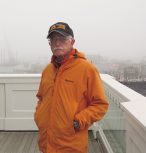DNA reveals the past and future of coral reefs
New DNA techniques are being used to understand how coral reacted to the end of the last ice age in order to better predict how they will cope with current changes to the climate. James Cook Univer

From 2005 to 2022, the main node of the ARC Centre of Excellence for Coral Reef Studies was headquartered at James Cook University in Townsville, Queensland (Australia)








Abstract. In response to domination of social impact analyses by economists, a model was developed which was originally referred to as a “non-economic social impact analysis” model, or NESIA. Recently, when it was noted that analyses conducted using the NESIA model often included a few economic variables, it was decided that NESIA was an inappropriate title because the model also included psychological, biological (human), and technological variables in addition to merely “social” variables. The presentation will describe the model and development of some of the indicators used in the application of the model. An example of the application of the model will focus on an analysis of fishery management’s impacts on individual well-being in the NE Region of the USA and Alaska. Development of indicators used will be discussed and path analysis will be used to test aspects of the model. The focus will be on psychological variables, an important anthropic impact that is often overlooked.
Biography. From 1975 to 2006 Richard Pollnac conducted research and evaluation of fishery and coastal development projects in Africa, Latin America, Azores, Middle East, India, South Pacific (Tonga, Samoa), New England and Alaska, and Southeast Asia. From 2006-2009 he was involved in fieldwork in the Caribbean evaluating factors influencing success of marine protected areas (MPAs), preparation of fishery community profiles, fieldwork ground-truthing fishery community profiles and numerical taxonomies of fishing communities for the Northeast USA, fieldwork concerning networking of marine protected areas (Philippines), and a project evaluating job satisfaction in capture fisheries (world-wide). From 2009-2014 he has been involved in research concerning impacts of management on well-being & change in NE USA fishing communities, evaluating sociocultural aspects of marine reserve governance as well as social networks of near-shore marine biologists in Puget Sound, assessment of the introduction of turtle excluding devices and ring hooks in Ecuador and Costa Rica, assessing of the impacts of integrated population, health & environment projects in the Philippines, and conducting (as co-PI) a “learning analysis” of the impacts of the of the Coral Triangle Support Project (CTSP) of the Coral Triangle Initiative (CTI), and involved in development and analysis of resilience and/vulnerability indicators for US fisheries (NE Region and Alaska) for NOAA Fisheries. In 2014 he became involved in 2 new projects: an assessment of MPAs in Puget Sound and an evaluation of illegal fishing activities in Somalia. From 2014 to 2017 he remained involved in the Puget Sound MPA project, initiated and carried out a project assessing factors influencing resilience and well-being in Rayong Province Thailand, and acted as a consultant on a new (2016-2017) MPA project in Puerto Rico. He is currently planning a new project concerning factors influencing the interrelationships between fishery management, perceptions of climate change and well-being of small-scale fishers in the Gulf of Thailand. Richard Pollnac is a Research Professor at the University of Rhode Island and an Affiliate Professor at the University of Washington. Abbreviated publication list can be found at http://web.uri.edu/maf/richard-pollnac/
New DNA techniques are being used to understand how coral reacted to the end of the last ice age in order to better predict how they will cope with current changes to the climate. James Cook Univer
A new study on the effects of climate change in five tropical countries has found fisheries are in more trouble than agriculture, and poor people are in the most danger. Distinguished Profess
James Cook University researchers have found brightly coloured fish are becoming increasingly rare as coral declines, with the phenomenon likely to get worse in the future. Christopher Hemingson, a
Researchers working with stakeholders in the Great Barrier Reef region have come up with ideas on how groups responsible for looking after the reef can operate more effectively when the next bleaching
Abstract: As marine species adapt to climate change, their heat tolerance will likely be under strong selection. Individual variation in heat tolerance and its heritability underpin the potential fo
Abstract: The Reef Ecology Lab in KAUST’s Red Sea Research Center explores many aspects of movement ecology of marine organisms, ranging from adult migrations to intergenerational larval dispersal
Abstract: Macroalgal meadows are a prominent, yet often maligned component of the tropical seascape. Our work at Ningaloo reef in WA demonstrate that canopy forming macroalgae provide habitat for ad
Abstract: Sharks are generally perceived as strong and fearsome animals. With fossils dating back at least 420 million years, sharks are not only majestic top predators but they also outlived dinosa
Abstract: Connectivity plays a vital role in many ecosystems through its effects on fundamental ecological and evolutionary processes. Its consequences for populations and metapopulations have been
Abstract: Evolution of many eukaryotic organisms is affected by interactions with microbes. Microbial symbioses can ultimately reflect host’s diet, habitat range, and even body shape. However, how
Abstract: The past few years have seen unprecedented coral bleaching and mortality on the Great Barrier Reef (GBR) but the consequences of this on biodiversity are not yet known. This talk will expl